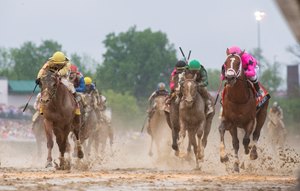Appeals Court Ruling Backs Derby DQ of Maximum Security


More than 15 months after the 2019 Kentucky Derby Presented by Woodford Reserve (G1), the race outcome, in which Country House was placed first after first-to-the-wire Maximum Security was disqualified for interference, may finally be official.
On Aug. 28—just eight days before this year's rescheduled Derby—a United States Court of Appeals backed a lower federal court's November 2019 decision to not consider a lawsuit brought by Maximum Security's owners, Gary and Mary West, that aimed to overturn the stewards' decision.
After the United States District Court for the Eastern District of Kentucky in Lexington dismissed the Wests' case for failure to state a claim, the Wests appealed that court's decision to the United States Court of Appeals for the Sixth Circuit in Cincinnati—asking the appeals court to send the case back to district court to be heard.
On Friday, the appeals court ruled that the district court acted properly in dismissing the case.
"What should have been the fastest two minutes in sports turned into over a year of litigation," the appeals court wrote in its 14-page decision. "Neither Kentucky law nor the Fourteenth Amendment allows for judicial second-guessing of the stewards' call. For the foregoing reasons, we affirm the judgment of the district court in full."
The appeals court's ruling backs the opinion of U.S. District Court Judge Karen Caldwell, who ruled Nov. 15, 2019, that disqualification decisions are not subject to judicial review and that the disqualification procedure in place does not implicate an interest protected under the due process clause of the Constitution.
Friday's appeals court ruling also bolsters Kentucky's rules that do not allow stewards' calls on issues in the running of the race, like interference calls, to be appealed. The Kentucky rules are in line with the model rules of the sport, which aim to have stewards have the final say on matters related to the running of the race.
The Wests filed the lawsuit in U.S. District Court May 14 after Maximum Security finished first in the May 4 Derby at Churchill Downs but was disqualified to 17th for interference near the five-sixteenths pole. The litigation named the Kentucky Horse Racing Commission, commission members, commission staff, and the stewards—Kentucky chief steward Barbara Borden, Brooks "Butch" Becraft, and association steward Tyler Picklesimer—as defendants and referred to the disqualification of Maximum Security as a "bizarre and unconstitutional process."
But the appeals court reviewed the Wests' case and even with a low bar in place—as it was only determining whether the case should be heard by the district court—didn't find that any of the Wests' complaints needed to be considered by the district court.

The Wests had argued that the stewards' decision to disqualify Maximum Security is a "final order of an agency" that is subject to judicial review under Kentucky law. The appeals court said the referenced state law refers to administrative hearings and final orders of an agency and determined that the stewards' decision did not fall into that category.
This point was discussed at length when the appeals court heard oral arguments in the case June 16. In its decision released Friday, the court said the stewards' decision was not an administrative hearing because it did not meet the statutory definition of a "final order" of an agency and it was not made by the head of an agency, as is necessary to meet the definition.
"Horse racing stewards are appointed by the (KHRC) to act as referees of all horse races in the commonwealth," the court commented. "Stewards make final decisions as to race objections based on their authority under (Kentucky regulations). The powers given to the stewards under that regulation arguably resemble the authority of an administrative agency. … However, the process by which the stewards make those decisions does not sufficiently approximate an administrative hearing in the traditional sense."
The Wests also argued that they were deprived "protected liberty and property interests" by the disqualification of Maximum Security. But the appeals court said Kentucky law notes that participation in horse racing "is a privilege and not a personal right." It also noted that the Wests never possessed the property of the winning purse as "the state's decision to award or withhold the benefit is wholly discretionary."
The court noted that the stewards have "unbridled discretion in determining whether a racing foul occurred, and whether to disqualify a horse for a foul committed during the race. The court noted that even though no horse had previously been disqualified from victory in the Derby for interference, "the fact remains that the stewards have always had the discretion to call fouls in horse races; this just happens to be the first time they exercised this discretion in the Kentucky Derby."
